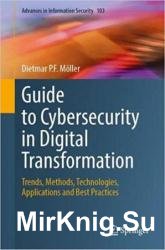 Название: Guide to Cybersecurity in Digital Transformation: Trends, Methods, Technologies, Applications and Best Practices Название: Guide to Cybersecurity in Digital Transformation: Trends, Methods, Technologies, Applications and Best Practices
Автор: Dietmar P.F. Moller
Издательство: Springer
Серия: Advances in Information Security
Год: 2023
Страниц: 432
Язык: английский
Формат: pdf (true)
Размер: 10.5 MB
In today’s digital transformation environments, a rigorous cybersecurity approach to effective risk management ? including contingency planning, outlining immediate actions, preparing post-breach responses ? is central to defending organizations’ interconnected computer systems, networks, and infrastructure resources from malicious cyber-attacks.
Specifically, cybersecurity technologies, processes, and practices need to be generalized and applied to intrusion detection and prevention measures. This entails analyzing profiles of cyber-attackers and building cyber-attack models for behavior simulation that can effectively counter such attacks. This comprehensive volume aims to cover all essential aspects of cybersecurity in digital transformation and to provide a framework for considering the many objectives and requirements involved. In addition to introducing theoretical foundations, the work also offers practical techniques for defending against malicious cybercriminals.
However, there is still a risk in using the latest digital technologies and their applications, meaning a bigger attack surface, from the perspective of cybersecurity and resilience. Therefore, the book outlines internal in-depth research and experience gained over multiple engagements of digitization in the context of digital transformation and the need for cybersecurity, which has achieved great interest in industrial, public and private organizations. In this context, the book provides a systematic overview of the latest development of core research areas in methods and technologies in cybersecurity in digital transformation. The focus is on threats, threat intelligence, intrusion detection and prevention, cyberattack models and scenarios, cybersecurity ontology, NIST cybersecurity framework and MITRE cybersecurity criteria, ransomware attack risks with regard to ransom cost and loss of reputation, cybersecurity maturity models and SWOT analysis as well as Machine Learning and Deep Learning in the application of defending the cybersecurity risk.
Topics and features:
Explores cybersecurity’s impact on the dynamics of interconnected, complex cyber- and physical systems, infrastructure resources, and networks
Provides numerous examples of applications and best practices
Considers methods that organizations can use to assess their cybersecurity awareness and/or strategy
Describes anomaly intrusion detection, a key tool in thwarting both malware and theft (whether by insiders or external parties) of corporate data
Addresses cyber-attacker profiles, cyber-attack models and simulation, cybersecurity ontology, access-control mechanisms, and policies for handling ransomware attacks
Discusses the NIST Cybersecurity Framework, MITRE Adversarial Tactics, Techniques and Common Knowledge, CIS Critical Security Controls, and the ISA/IEC 62442 Cybersecurity Standard
Gathering all the relevant information, this practical guide is eminently suitable as a self-study resource for engineers, scientists, computer scientists, and chief information officers. Further, with its many examples of best practices, it can serve as an excellent text for graduate-level courses and research into cybersecurity.
Скачать Guide to Cybersecurity in Digital Transformation: Trends, Methods, Technologies, Applications and Best Practices
|